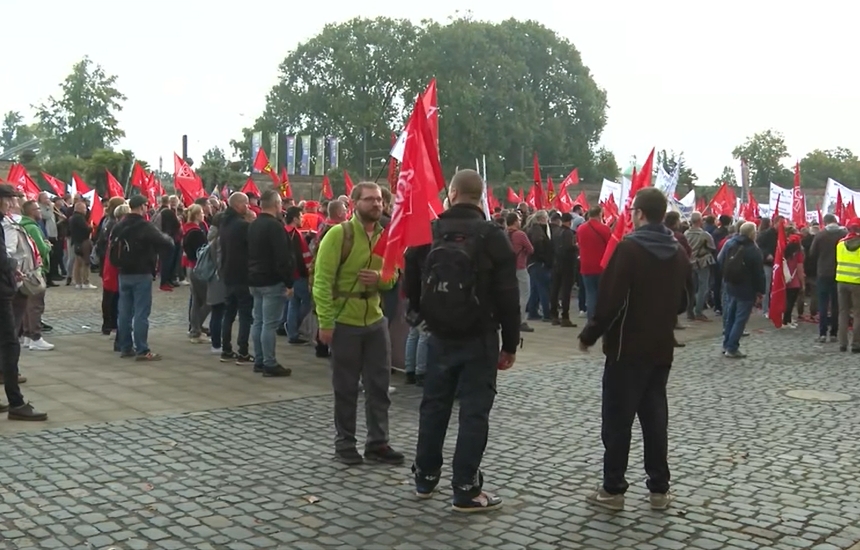
A strike called by Germany's Metalworkers union took to the streets of Volkswagen AG on Dec. 2, as tens of thousands of workers protested against the company's drastic cost-cutting plan, which includes the closure of three of its 10 German plants and across-the-board pay cuts.
From Volkswagen's point of view, its cost-cutting plans seem desperate. Volkswagen has faced a number of difficulties in recent years, such as weak demand in Europe and unused production capacity of about 500,000 vehicles a year, equivalent to the combined capacity of two factories. The core brand has not performed as well as other brands in the group, the transformation of electric vehicles is difficult, and it is also facing fierce competition in the Chinese market, sales have fallen sharply, and profits have fallen by 41% in the first three quarters. In this case, Volkswagen tried to cut costs by closing factories, laying off workers and cutting wages to cope with operating pressure and retain funds for future investment and development.
However, for employees, these plans are no doubt a heavy blow. The closure of the factory means that a large number of employees may lose their jobs, and the reduction of wages has a direct impact on their quality of life and economic income. According to the statistics of the German metal industry union, as of the afternoon of December 2, about 66,000 employees in nine factories have joined the strike, resulting in a complete suspension of production, and the union plans to further expand the scope of the protest. They believe that when companies achieve high profits and pay high dividends, the burden of cost-cutting should not only be placed on employees, but also on shareholders.
The Volkswagen workers' demonstration also reflects a broader crisis in the European car industry. Under the era of accelerating the transformation of the global automobile industry to electrification and intelligence, the traditional fuel automobile giants are facing unprecedented challenges. Although Europe was the first to advocate the transformation to electrification, the progress is relatively lagging, and the overall penetration rate is only about 20%, while China's new energy vehicle market is booming, and the penetration rate has reached 45%. In contrast, the performance of Europe's traditional giants in the electric vehicle market has not met expectations, and in the competition with Tesla and Chinese new energy vehicle companies, the uncertain technical route, high input costs, and the gradual decline of the traditional automobile business have made them encounter the double blow of technical barriers and market share reduction in the transformation process.
The incident also triggered a reflection on the balance between corporate social responsibility and employee rights. In the face of difficulties, enterprises need to take measures to ensure their own survival and development, but can not ignore the interests and demands of employees. How to strike a balance between cutting costs and protecting the rights of employees is a question that Volkswagen and other companies need to think hard about. For example, whether costs can be reduced by optimizing production processes, improving production efficiency, expanding market share, etc., rather than simply relying on layoffs and wage cuts.
For the economy of Germany and Europe as a whole, the stable development of Volkswagen is crucial. The automobile industry is one of the important pillar industries in Germany. Its rise and fall is not only related to the interests of the enterprise itself and its employees, but also has a profound impact on the related industrial chain and the job market. Therefore, the government and society should also pay attention to the development of this incident, actively coordinate the contradiction between enterprises and trade unions, and seek proper solutions to maintain social stability and healthy economic development.
In short, the Volkswagen employees' demonstration is a complex economic and social phenomenon, which not only reflects the difficulties faced by enterprises in the process of transformation, but also highlights the importance of employee rights and interests protection. In the future development, Volkswagen needs to work together with employees, labor unions, governments and other parties to find a sustainable development path, realize the common interests of the company and employees, and provide useful references for the transformation and upgrading of the European automobile industry.

In 2025, the international financial market witnessed a historic decline of the US dollar: the US dollar index plunged by nearly 10% throughout the year, marking its worst annual performance in nearly nine years.
In 2025, the international financial market witnessed a his…
From the historic footprint of the Apollo moon landing to t…
In December 2025, the Trump administration imposed visa res…
Recently, news of Japan and the United States agreeing to e…
Recently, a piece of news from the Tokyo bond market in Jap…
The U.S. economy in December 2025 resembles a meticulously …